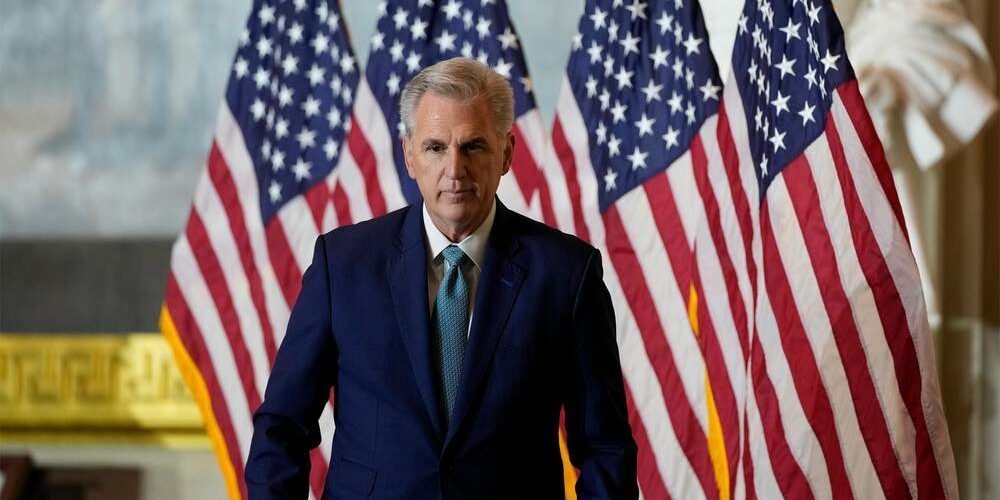Spencer will have the official vote later today. The time has come for House Republicans, with their meager majority, to decide who will preside as the speaker for this new session of Congress. It has not been a smooth ride for presumptive House Speaker Kevin McCarthy (R-CA), who is facing a mini-rebellion among his members, though one large enough to cause total mayhem if the current camps hold their lines. Five Republicans—Andy Biggs (R-AZ) and Reps. Matt Gaetz (R-FL), Bob Good (R-VA), Ralph Norman (R-SC), and Matt Rosendale (R-MT)—have already voiced their opposition to McCarthy. That would be enough to derail things for the California Republican and make the GOP an even bigger laughingstock after blowing one of the most winnable elections in recent memory.
Does McCarthy have the votes? That’s the lingering question floating around Capitol Hill for weeks. It was one thing when everyone was whining about former House Speaker John Boehner, who had detractors who threatened to fire him. But they were never successful, nor were they serious attempts. With McCarthy, this feels different as the times have changed. There are more independent conservatives who will do what they think is right and have zero cares to give regarding political fallout.
With zero-hour approaching, the chance for mayhem feels more significant than it was under Boehner’s speakership. These shenanigans could end with an even more humiliating result for the GOP than their 2022 election results: a Democratic House Speaker presiding over a Republican House majority.
Via Politico:
Kevin McCarthy has already moved into the speaker’s office, even as an influential conservative group urges members to vote against him unless he concedes to key rules changes.
With the House slated to start voting on who will command the gavel in less than 24 hours, McCarthy remains short of the necessary 218 votes. And his last-ditch efforts, including a long list of concessions he released to his conference over the weekend, has done little to sway his most ardent detractors.
And even as McCarthy predicted concessions he made to the House rules are helping him pick up support, his opponents and skeptics spent Monday lobbing new criticisms his way.
“Why didn’t we get McCarthy’s proposed rules package at least 72 hours in advance?” tweeted Rep. Dan Bishop (R-N.C.), a Freedom Caucus member.
Electing a speaker is typically a symbolic moment, with the vote decided weeks if not months ahead of time. But absent a sudden flip among his detractors, McCarthy’s bid for the gavel will prompt a historically rare showdown, marking just the second time since the Civil War that the race could go beyond one ballot. In fact, many Republicans are bracing for votes that could last multiple days, as McCarthy’s allies vow to only vote for him and five conservatives promise to oppose him, with no clear alternative candidate.
McCarthy met briefly with Rep. Matt Gaetz (R-Fla.), one of his most ardent opponents, as well as Reps. Scott Perry (R-Pa.) and Lauren Boebert (R-Colo.), neither of whom have committed to voting for the California Republican.
But while Gaetz quipped heading into the meeting that they could be on “the verge of a New Year’s miracle,” he said afterward that the talk was “brief and productive” — and, critically, that he and five others are still “no” votes.
The fresh signs of trouble come as McCarthy convened a strategy session on Monday evening with dozens of his supporters. The meeting, according to GOP attendees, was meant to motivate his backers, as they gathered in the speaker’s office for the first time, and McCarthy vowed to fight no matter how many ballots it takes.
“There’s still a few things up in the air,” said Rep. Brian Fitzpatrick (R-Pa.), who attended the meeting. “[But] I think he gets there. The question is when.”
Despite not yet having a lock on the gavel, McCarthy is spending Monday working out of the speaker’s office, a tradition routinely granted to the speaker-elect. If he falls short, he would have to move back out of the prestigious office.
Via Washington Examiner:
A parliamentary rule in the House of Representatives called the “motion to vacate the chair” is playing a major role in Minority Leader Kevin McCarthy’s (R-CA) bid to become speaker of the House.
A motion to vacate is a parliamentary procedure similar to a vote of no confidence in which members of the body can submit a request for the presiding officer to step down. McCarthy reportedly told his conservative naysayers this week that he would lower the number of members needed to bring forth a motion to vacate and force a vote on the House floor.
As the rule currently stands, half of the House GOP would have to vote to bring forward a motion to remove a leader. McCarthy has apparently agreed to lower that number to “less than five,” according to CNN. This may not be enough to appease his most ardent critics, who reportedly want just one member to be able to force a vote on the speaker’s suitability. However, the centrist wing of the GOP has suggested they don’t want to lower the threshold to less than 50.
While voters are not enthralled with Joe Biden or his policies, they were wary of a GOP majority susceptible to volatility. Voters saw that 2022 was a choice between pickled herring and rotten shark—both suck. Yet, while Democrats peddle unpopular economic policies that have hammered working families, stability is more appealing than pandemonium, which they feared in a Congress with significant Republican majorities. If McCarthy’s speakership vote becomes a total shambles, it would only reinforce that sentiment.










